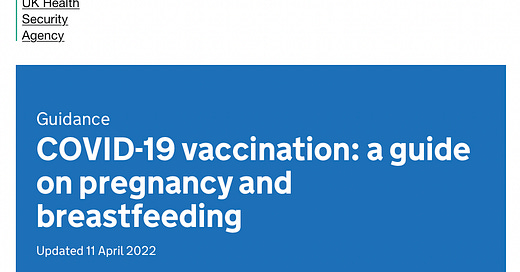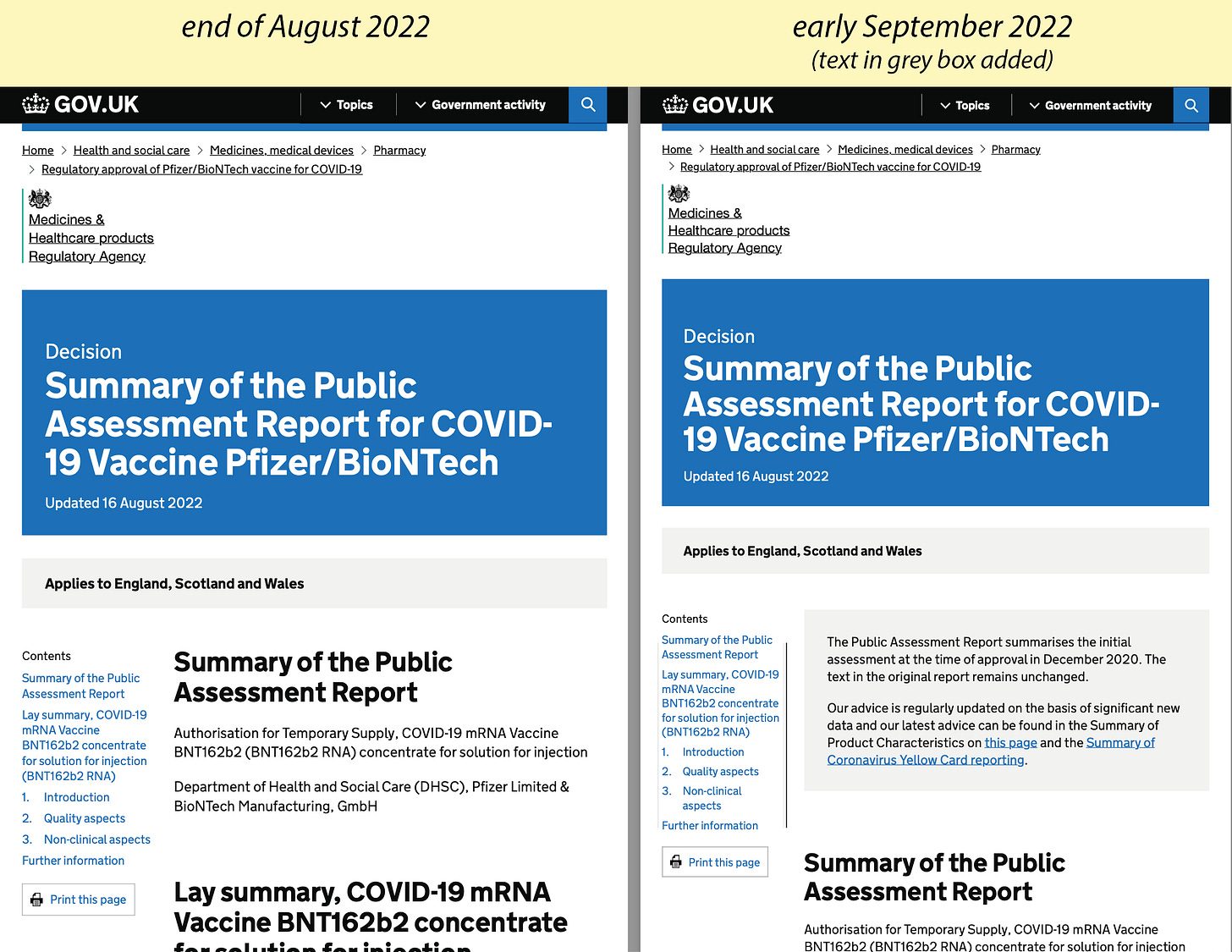On the rumoured change in UK Covid vaccination recommendations for pregnant and breastfeeding women, August 2022
Beware of red herrings…
In late August 2022, rumours circulated that the UK government had discreetly changed its recommendation on covid vaccination for pregnant and breastfeeding women and was no longer recommending vaccination.
The UK government’s advice had, for some time, been that, "COVID-19 vaccination is strongly recommended for pregnant and breastfeeding women." [1]
However, at the end of August 2022, various people observed that a UK government document / web page, dated August 2022, stated that vaccination was not recommended for pregnant and breastfeeding women. The document in question [2] was titled:
”Decision”
”Summary of the Public Assessment Report for COVID-19 Vaccine Pfizer/BioNTech”
“Updated 16 August 2022”
The document contained the following text in section “3.4 Toxicology”, “Toxicity conclusions”:
“In the context of supply under Regulation 174, it is considered that sufficient reassurance of safe use of the vaccine in pregnant women cannot be provided at the present time: however, use in women of childbearing potential could be supported provided healthcare professionals are advised to rule out known or suspected pregnancy prior to vaccination. Women who are breastfeeding should also not be vaccinated”
At first glance, it appeared that the UK government, as at 16 August 2022, was no longer recommending vaccination of pregnant and breastfeeding women. Further, given that there had been no known public announcement on the matter, one might even wonder if the hope was to draw as little attention as possible to the change and, if so, why…?
However, a closer look showed that, despite describing itself as “Updated 16 August 2022”, the document was older and, while it appeared there had been edits made over time, the page had probably not been fully reviewed or rewritten. As evidence supporting this assessment:
1) At the end of "Toxicity Conclusions", the page informs that “Adequate advice with regard to women of childbearing potential, pregnant women and breastfeeding women has been provided in both the Information for UK Healthcare Professionals and the Information for UK recipients.”. The two hyperlinks contained in that text, for professionals [3] and recipients [4], both appeared to be old. Both showed “ARCHIVE” ahead of their headings and noted that “Stock authorised under Regulation 174 is no longer in use. Please see here for latest product information.”
2) In section "1. Introduction”, covid deaths and cases figures are mentioned: "At the time of this report, the number of COVID-19 cases in the UK is estimated at 1.64 million and more than 60,000 deaths have been attributed to the disease." These figures would date the document around December 2020, as those were the approximate official cumulative totals at that time (verified using ourworld in data [5]). Given that covid vaccines were being introduced around that period, this would make sense as an original date for the document. At that time there had not yet been a recommendation to vaccinate pregnant or breastfeeding women - this came later. These deaths and cases figures were presumably not later updated (despite the “16 August…” heading), implying that one could not assume other parts of the document were necessarily updated either.
3) At the end of Section "1. Introduction" the page reads...
"On 4 June 2021 the MHRA granted an extension of indication to ‘the active immunisation to prevent COVID-19 caused by the SARS-CoV-2 virus, in individuals 12 years of age and older’." Clearly then, updates had been made to the page, but, given the previous two points, it seems that any updates made were selective. It certainly does not appear that all parts of the document were kept up to date or rewritten.
It would, therefore, seem that...
1) The document in question, “Summary of the Public Assessment Report for COVID-19 Vaccine Pfizer/BioNTech, Updated 16 August 2022” [2], was not current (as at August 2022) and probably originated around December 2020.
2) Edits / updates had been made to the original document.
3) However, there had probably not been a thorough review or rewrite of the document as a whole. In fairness, it may be that, as a historical document, the contents are not meant not be substantially changed. If so, however, given that an edit was made for ages 12+, adding a similarly note for pregnancy and breastfeeding, or making the status of the document / web page clearer - perhaps with a note at the top of the page - would have saved a good deal of confusion.
From which we conclude that…
It is probably not the case that the UK government changed its recommendation on vaccinating pregnant and breastfeeding women from ‘recommended’ to ‘not recommended’. One cannot conclude from the document discussed, “Summary of the Public Assessment Report for COVID-19 Vaccine Pfizer/BioNTech, Updated 16 August 2022” [2], that such a change took place. The recommendation it contained against vaccinating pregnant and breastfeeding women was most likely old, dating back to the first days of covid vaccines, probably around December 2020. As in most countries this was later superseded by a strong recommendation in favour of vaccinating such women...
In short, a red herring.
Epilogue:
As I make final edits, I see that this story has now been reported by the BBC, under the heading. “Covid: Pregnant women targeted with false vaccine claims” [6]. The article begins, “Inaccurate messages shared by thousands claimed that pregnant or breastfeeding women were now recommended not to take the vaccine. In fact, the NHS says the vaccine is both safe and strongly recommended for this group. The misleading claim came from a now out-of-date document from 2020…”.
The BBC article confirms that the conclusions above were correct: namely, that the recommendation to vaccinate pregnant and breastfeeding women had not changed, that the document / web page which caused the rumours was old etc…
The article then, inevitably, goes on to discuss various other aspects, for example:
“A Department of Health and Social Care spokesperson said: "Covid vaccines are safe and highly effective both for pregnant women and for those who are breastfeeding.
"This is backed by extensive real-world data, including global analysis outside of clinical trials and in healthcare settings."
Final thoughts:
Given the nature of recent and current events and the discussions (or lack of…) around them, I have, quite deliberately, endeavoured in this piece to stick coldly to the matter at hand - namely the question of whether or not the rumours of a change in recommendation were correct and how one might determine that from the available information. For clarity and brevity, the myriad of surrounding issues were not brought in to the discussion. The observations, conclusions and quoting of texts above are not intended to convey any kind of opinion on, or endorsement of, the recommendations themselves, or the products concerned. The intention was merely to investigate the rumours and deduce whether or not a change in recommendation had occurred, in order to determine the truth and in the hope that doing so would be helpful. In keeping with that spirit, I add no comment here on the BBC article.
Update, 3 Sep 2022. More media coverage and a change to the web page:
After the original version of this text was published, the story quickly spread to several media platforms, who, along with the usual ‘experts’ and social media types, used it to criticise ‘sceptics’ (not their preferred term, of course) for ‘spreading misinformation’. To suggest bad faith or to condemn a simple misunderstanding is something of a cheap shot, but nothing new. The fact is, the web page concerned was unclear and could easily be interpreted in the way that many did. But, as explained carefully above, to the best of my knowledge, it is true that the rumours of a change in recommendation were incorrect.
On the question of good vs bad faith and openness to correcting errors, I would ask: How many ‘experts’, ‘journalists’, ‘leaders’ or social media types, so quick to damn ‘sceptics’ for daring to question the Narrative, would query something that their peers thought to be true? How many would undertake a careful analysis of the matter; determine that the commonly held belief was indeed wrong; and then publish their findings for the world to see? Very few, if any, I suspect. The truth is, the ‘sceptics’ I know (including, I hope, this author), are doing their best, under circumstances that are often a long way from pleasant, to act in good faith.
The UK government document / web page from which the confusion stemmed, “Summary of the Public Assessment Report for COVID-19 Vaccine Pfizer/BioNTech” [2], has, in the couple of days since the above analysis was published, been updated. The following text has been added, in a grey box at the top of the page:
“The Public Assessment Report summarises the initial assessment at the time of approval in December 2020. The text in the original report remains unchanged.
Our advice is regularly updated on the basis of significant new data and our latest advice can be found in the Summary of Product Characteristics on this page and the Summary of Coronavirus Yellow Card reporting.”
This text was not on the website at the end of August 2022, when the original text of this article was written and published. The screenshots below show the ‘before’ and ‘after’ versions of the page.
The additional text is a welcome clarification, presumably in response to the incident or to comments such as those made in this article. Its addition suggests that those editing also realised that the page, as it stood, could be misinterpreted. Purists might point out that, strictly speaking, adding the new text renders incorrect the "Updated 16 August 2022”, which still appears in the heading (since the page has clearly been updated at some point during the first days of September); but I am sure this is unintentional.
However….
It appears that some of the aforementioned ‘expert’, ‘journalist’ or social media types might now be assuming that the new ‘grey box’ text was on the web page all along and that the ‘sceptics’ either foolishly missed it, or worse, deliberately ignored it. As explained above, the web page was changed: the text is new. The most likely explanation, therefore, as to why ‘sceptics’ neither saw nor reported on the ‘grey box’ text is that it did not exist!
Will those who have made this ‘grey box’ error and misjudged others as a result, now expect themselves to be vilified, censored and suspended from social media - just as the ‘sceptics’ regularly are? Fat chance! But, of course, that’s another kettle of fish altogether…
And all this over one red herring.
Notes / Refs:
[1] https://www.gov.uk/government/publications/covid-19-vaccination-women-of-childbearing-age-currently-pregnant-planning-a-pregnancy-or-breastfeeding/covid-19-vaccination-a-guide-for-women-of-childbearing-age-pregnant-planning-a-pregnancy-or-breastfeeding
[2] https://www.gov.uk/government/publications/regulatory-approval-of-pfizer-biontech-vaccine-for-covid-19/summary-public-assessment-report-for-pfizerbiontech-covid-19-vaccine
[3] https://www.gov.uk/government/publications/regulatory-approval-of-pfizer-biontech-vaccine-for-covid-19/information-for-healthcare-professionals-on-pfizerbiontech-covid-19-vaccine
[4] https://www.gov.uk/government/publications/regulatory-approval-of-pfizer-biontech-vaccine-for-covid-19/information-for-uk-recipients-on-pfizerbiontech-covid-19-vaccine
[5] https://ourworldindata.org
[6] https://www.bbc.co.uk/news/health-62739554
Web pages, quoted text and screenshots are as at 31 August 2022 (with the exception of BBC article, added 1 September 2022).









